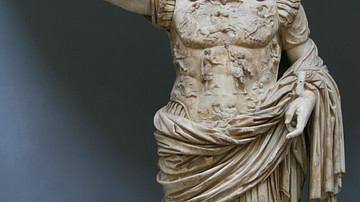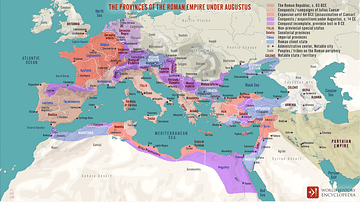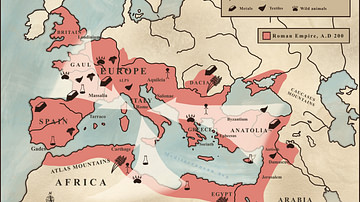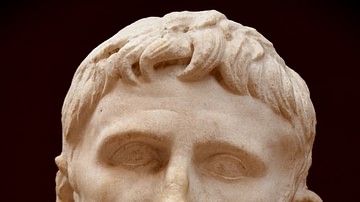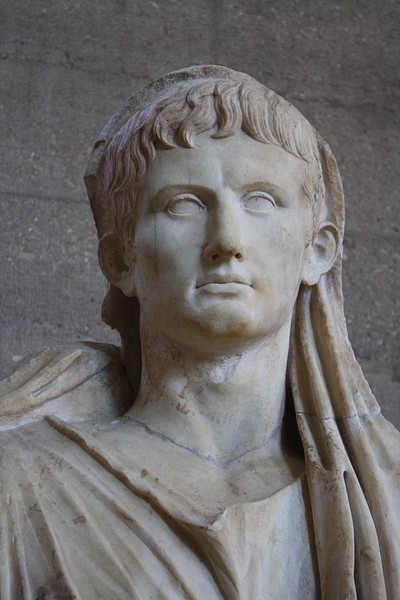
The Pax Romana (Roman Peace) was a period of relative peace and stability across the Roman Empire which lasted for over 200 years, beginning with the reign of Augustus (27 BCE - 14 CE). The aim of Augustus and his successors was to guarantee law, order, and security within the empire, even if this meant separating it from the rest of the world and defending, or even expanding, its borders through military intervention and conquest.
Throughout the existence of both the Roman Republic and Empire, the borders of Rome continually expanded. Besides the initial territorial conquests after the Punic Wars, the eternal city added land in the Balkans, Middle East, and North Africa. Later, they would move westward into Gaul, Spain and northward into Germany and Britain. Through the triumphs of Caesar, Augustus, Claudius, and Marcus Aurelius, Rome became one of largest empires that had ever existed, greater than that of Persia, Assyria, and even challenging that of Alexander the Great. However, a territory that large caused many difficulties, many of them costly - riots, rebellions and insurrections were rampant. The solution to many of these problems came under the astute leadership of Emperor Augustus - it was called the Pax Romana or Roman Peace.
Augustus Becomes Emperor
The death of the “dictator for life” Julius Caesar on the Ides of March 44 BCE brought chaos to the Republic. Attempts to revive the old triumvirate ultimately failed. Octavian, the young adopted son of Caesar, hunted down his “father's” assassins and defeated the other claimants to the throne (Mark Antony and Marcus Amelius Lepidus), securing for himself the leadership of Rome and so an empire was born. Augustus, as he would now be known, would usher in an unprecedented era of prosperity and stability; the disorder of the previous years was wiped away.
The Roman Senate granted Augustus almost unlimited powers, bringing reform to both the city and provinces. He became the “first citizen” or princeps, thus initiating the principate. The Senate granted him and his successors certain powers for life: namely imperium maius, extreme authority over the provincial governors, and tribunicia potestas or tribune of the plebs, the authority to call an assembly of the people to enact laws. With these newly generated powers, he could veto the actions of the magistrates and, in order to control those around him, he controlled the imperial patronage. His reign would bring peace and security to both politics and trade - something that many Romans, in the city as well as in the provinces, had long desired. However, peace would come at a steep price. This Augustan Peace, a peace that brought relative quiet, would last for almost two hundred years.
The Empire Expands
While the Rome Augustus inherited was vast by any definition of the word, he chose to aggressively add even more territory with expansion and conquest in all directions, especially westward and along the Rhine. Likewise, these new provinces, as well as those that had been acquired during the Republic, were forced to affirm their allegiance to Rome and recognize Roman authority. Augustus would return home from Spain and Gaul a hero, and to symbolize this success, the Senate commissioned, in July of 13 BCE, the erection on the Campus Martius of the Ara Pacis Augustus or the Altar of Augustan Peace - what would be called the foremost display of Augustan art. Dedicated on January 1, 9 BCE, it contained sculptured reliefs, a religious mural depicting the imperial family, and a frieze portraying various Roman values: peace, harmony, duty, decency and wealth - pax, concordia, pietas, humanitas and copia.

Augustus Manages Rome & the Empire
To many in and around Rome, the new emperor appeared to be a micromanager, fully utilizing all of the powers he had been granted. Distrusting the independence of the provincial governors or proconsuls, he travelled the empire extensively, and with him went a new army (he commanded 23 legions), a professional army. To maintain their loyalty he paid them well in both money and land (something his successors followed) with each and every man swearing an oath to support and protect the emperor. With an increased army, revolts - like those in Gaul or along the northern borders - were easily quelled. And, to safeguard himself and prevent his own Ides of March, Augustus created his own bodyguard the Praetorian Guard.
The ever-growing empire and expanded army took a toll on the empire's limited treasury. To solve this problem Augustus ordered a complete census of the resources in all of the provinces as well as among its citizenry, creating a “framework for assessment” to impose taxes. The aim was not only to maintain internal order but also to extract resources through taxation even though these demands were often made on limited resources. And to safeguard the tax revenue from possibly unscrupulous governors, Augustus centralized the treasury on the Capitol in Rome. Although there was an occasional protest, many believe that his close supervision of the both the city and provinces was justified, and while some people - primarily slaves and freedmen who worked the land — were excluded from any political participation, the empire remained relatively free of civil conflict. Even the seas were cleared of pirates, enabling the expansion of trade. New roads - over fifty thousand miles of them - made communication easier. Rome was made great again.
One place that benefitted most from the Pax Romana was the city of Rome itself. Among his many reforms, Augustus provided for protection against possible fire (a common Roman condition), famine, and flood (the Tiber was prone to overflow its banks). He supervised the city's grain supply, water, and roads which had been a function of the aediles. The city police force was enlarged to quell riots and crime in city. He made attempts to restore traditional moral values such as rebuilding decaying temples. Although the Senate still served only as advisory body, he reduced its number and although the popular assemblies approved of his reforms, they soon became obsolete, for Augustus was the law.
A Lasting Peace
Regardless as it might appear, the Roman people understood and valued the peace and security that Augustus's new order brought to the empire. To them he became a god, and from this worship emerged the Imperial Cult. Henceforth, an emperor would (with only a few exceptions) be deified after his death. Although there still existed an occasional rebellion (Christians would oppose the Cult, for example), the empire remained largely at peace.
The emperors who followed Augustus maintained the Augustan Peace by reducing conflict, expanding the borders, and maintaining harmony at home. However, the legions of Rome were not always so warmly received, and to those who resisted, the cost of peace was high. In his On Britain and Germany, the historian Tacitus, who lived in the 1st century CE, wrote about the Roman conquest of Britain. He quoted Calgacus, a Briton leader, addressing his men,
We, the choice flower of Britain, were treasured in her most secret places. Out of sight of subject shores, we kept even our eyes free from the defilement of tyranny…to-day the boundary of Britain is exposed; beyond us lies no nation, nothing but waves and rocks and the Romans, more deadly still than they, for you find in them an arrogance which no reasonable submission can elude.
Calgacus continued, “They are unique in being as violently tempted to attack the poor as the wealthy. Robbery, butchery, rapine, the liars call Empire; they create desolation and call it peace.”
Despite these challenges, the Pax Romana would continue through the years, often despite the arrogance and inabilities of some of Augustus's successors. Emperor Claudius would finally succeed in Britain. Vespasian and his son Titus would secure the Middle East; however, Emperor Hadrian (117 – 138 CE) would call an end to expansion and fix the northern borders by building a wall and fortifications in Britain and along the Rhine. In the late 3rd century CE, plague and invasions devastated the empire, and cracks began to appear. After the death of Marcus Aurelius in 180 CE and the appearance of his heir Emperor Commodus, the concept of Pax Romana, after almost two hundred years, became an afterthought.
With the demise of the Republic, the government was in ruin. Emperor Augustus had gained political and military control and built an empire. He secured the borders, stabilized the economy, and brought a sense of peace. Augustus was quoted as saying, “I found a city of brick and left it one of marble.” - this quote could easily be expanded to include the entire empire.



